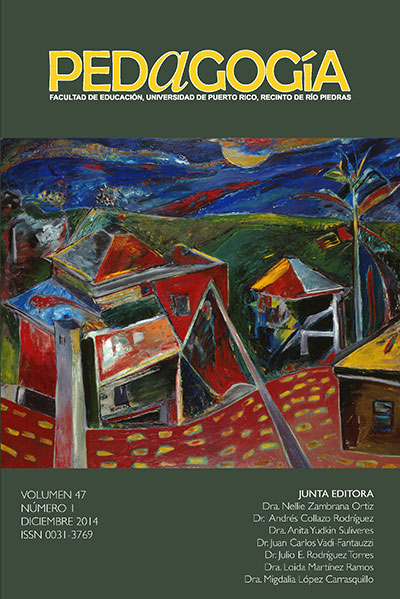Abstract
This article states the need for recognition and valorization of Dominican students in Puerto Rico‘s public schools. It starts with the discussion of various psychological and sociological educational considerations, which serve as a theoretical framework for the development of subsequent ideas. Additional themes discussed throughout this article include the consequences of Dominican immigration in the process of their integration to Puerto Rican society, the struggle of Dominican students to integrate into Puerto Rico‘s public schools, and the challenges that confront the public educational system to properly serve the multiethnic reality within their schools. Taking into consideration all the interrelated factors, the author proposes some alternatives to the problems and situations previously stated, framed within a social justice approach.
How to cite:
Scharrón-Del Río, M. A. (2014). Reconocimiento y valoración de los estudiantes dominicanos en las escuelas públicas de Puerto Rico: En ruta hacia la justicia social. Pedagogía, 47(1), 31-50. Retrieved https://revistas.upr.edu/index.php/educacion/article/view/16355
References
Bourdieu, P. (1986). The forms of capital. En J. Richardson (Ed.), Handbook of theory and research for the sociology of education (pp. 241-258). New York: Greenwood.
Bourdieu, P. (1989). El nuevo capital, introducción a una lectura japonesa de la nobleza de estado. En I. Jiménez (Ed.), Capital cultural, escuela y espacio social. Madrid, España: Siglo XXI Editores.
Bourdieu, P. & Passeron, J.C. (1990). Reproduction in education, society and culture. Londres, Inglaterra: Sage Publications.
Bronfenbrenner, U. (1986). Ecology of the family as a context for human development: Research perspectives. Developmental Psychology, 22, 723-742.
Bruner, J. (1984). Acción, pensamiento y lenguaje. Madrid, España: Alianza Editorial.
Bruner, J. (1990). Culture and human development: A new look. Human Development, 33, 344-355.
Bruner, J. (1996). The culture of education. Cambridge, Massachusetts: Harvard University Press.
Bruner, J. (1999). La educación: puerta de la cultura. Madrid, España: Visor Dis.
Bruner, J. (2001). Desarrollo cognitivo y educación. Madrid, España: Ediciones Morata.
Ciabattari, T. (2010-2011, invierno). Cultural capital, social capital, and educational inequality. Education, 87(2), 119-121.
Coleman, J. (1988). Social capital in the creation of human capital. American Journal of Sociology, 94, 95-120.
Coleman, J. (1990). Equality and achievement in education. Boulder, Colorado: Westview Press.
Constant, J. A. (2002). Implicaciones socioemocionales del antidominicanismo en Puerto Rico: Percepción del discrimen por los inmigrantes dominicanos en Puerto Rico y su integración a la sociedad puertorriqueña, área urbana de Caguas, a mayo de 2002 (Tesis inédita de maestría). Universidad de Puerto Rico, Río Piedras.
Duany, J. (2004). ¿El país de cinco pisos? La diversidad étnica en el Puerto Rico contemporáneo. Revista El Sol, Asociación de Maestros de Puerto Rico, 4-7.
Duany, J. (2005). Dominican migration to Puerto Rico: a transnational perspective. Centro Journal, 17(1), 243-268.
Esteban, M. (2010). Los diez principios de la psicología histórico-cultural. Fundamentos en Humanidades, 22, 47-62.
Esteban, M. (2011a). Ethnic identity in an intercultural geography. An empirical study. Canadian Social Science, 7(2), 64-71.
Esteban, M. (2011b). Una interpretación de la psicología cultural: Aplicaciones prácticas y principios teóricos. Suma Psicológica, 18(2), 65-88.
Fryberg, S. (2012). Cultural psychology as a bridge between anthropology and cognitive science. Topics in Cognitive Science, 4(3), 437–444.
Gordon, V. & Nocon, H. (2008). Reproducing segregation: Parent involvement, diversity, and school governance. Journal of Latinos and Education, 7(4), 320-339.
Hawloy, W. & Nieto, S. (2010, noviembre). Another inconvenient truth: Race and ethnicity matter. Educational leadership, 68(3), 66-71.
Hornby, G. & Lafaele, R. (2011). Barriers to parental involvement in education: An explanatory model. Educational Review, 63(1), 37-52.
Laboy-González, B. (1999). Estudio comparativo de las necesidades de estudiantes de escuela intermedia puertorriqueños y dominicanos: Implicaciones para el consejero escolar (Tesis inédita). Universidad de Puerto Rico, Río Piedras.
Ley Núm. 149 del 30 de junio de 1999, Ley Orgánica del Departamento de Educación Pública de Puerto Rico de 1999 (Ley de Reforma Educativa).
López Carrasquillo, A. (1999). Prácticas de aceptación y rechazo de estudiantes dominicanos en una escuela elemental en Puerto Rico. Revista de Ciencias Sociales, 6, 141-162.
Moll, L. (2014). L. S. Vygotsky and education. New York, NY: Routledge.
Moll, L., Amanti, C., Neff, D. & González, N. (1992). Funds of knowledge for teaching: Using a qualitative approach to connect homes and classrooms. Theory into Practice, 31(2), 132-141.
No Child Left Behind Act of 2001. Public Law 107 – 110. US Goverment.
Palincsar, A. S. (1998). Social constructivist perspectives on teaching and learning. Annual Review of Psychology, 49, 345-375.
Pizzinato, A. (2010) Psicología cultural: Contribuciones teóricas y fundamentos epistemológicos de las aportaciones de Vygotsky hacia la discusión lingüística de Bakhtin. Universitas Psychologica, 9(1), 255-261.
Rapp, N. & Duncan, H. (2012). Multi-dimensional parental involvement in schools: A principal‘s guide. International Journal of Educational Leadership Preparation, 7(1), 2-14.
Saubich, X. & Esteban, M. (2011). Bringing funds of family knowledge to school: The "Living Morocco" Project. Multidisciplinary Journal of Educational Research, 1(1), 57-81.
Theoharis, G. (2009). The school leaders our children deserve. New York, NY: Teachers College Press.
Torres-González, R. (2010). Sociedad y educación: Perspectivas teóricas y metodológicas. Recuperado de: http://public.me.com/roaroa
Torres-Roig, I. (2009). Tres miradas y una voz: Historias de vida de estudiantes dominicano-boricuas en escuelas públicas de Río Piedras (Disertación doctoral inédita). Universidad de Puerto Rico, Río Piedras.
Vygotsky, L. S. (1962). Thought and language. Cambridge, MA: The M.I.T. Press.
Vygotsky, L. S. (1978). Mind in society: The development of higher psychological processes. Cambridge, MA: Harvard University Press.
Wilson Copper, C., Riehl, C. & Hasan, A. (2010, noviembre). Leading and learning with diverse families in schools: critical epistemology amid communities of practice. Journal of School Leadership, 20, 768-788.
The contents published in the Puerto Rico Journal of Education is freely distributed under open access practices, in accordance with the Creative Commons license, Attribution-NonCommercial 4.0 International (CC BY-NC 4.0). Through these principles, the journal and its authors allow readers to access, reproduce and share articles in full text. Users should give credit to authors in a reasonable way without suggesting they have their support. Under no circumstances, readers may make use of the contents for commercial purposes. The authors retain copyright on their works.

